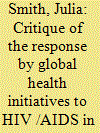| Srl | Item |
| 1 |
ID:
124516


|
|
|
|
|
| Publication |
2013.
|
| Summary/Abstract |
This article provides a critical perspective on global health initiatives (GHIs) in response to HIV/AIDS in post-conflict African countries. Focusing on the Global Fund to Fight HIV/AIDS, Tuberculosis and Malaria, the President's Emergency Plan for AIDS Relief and UN bodies, it argues that many global health initiatives lack consideration of the complexities of addressing HIV/AIDS in post-conflict contexts. It finds that prevention programmes fail to prioritize the population groups who are at high risk; that treatment and care interventions are shaped by an emergency aid paradigm, which does not ensure ongoing well-being for people living with HIV/AIDS; and that global health initiatives often impede the capacity of local governance and health systems. Given that global health initiatives have yet to fully engage with the challenges of implementing HIV/AIDS interventions in conflict-affected African contexts, the article concludes by proposing recommendations in this regard.
|
|
|
|
|
|
|
|
|
|
|
|
|
|
|
|
| 2 |
ID:
171936


|
|
|
|
|
| Summary/Abstract |
While debates continue about China’s role in sub-Saharan Africa, there is growing consensus that China is a different kind of development partner. One distinct feature of Chinese partnerships is that they include support for the tobacco industry, a sector other donor states and institutions shun. Not only is tobacco a primary agricultural export in a number of Africa states, the state-owned Chinese National Tobacco Corporation is the largest tobacco company in the world. This paper analyses Chinese support for the tobacco industry in three states – Zimbabwe, Malawi and Zambia – documenting how co-operation is shaped by Chinese state capitalism and assessing the development and governance implications. Following an introduction situating the analysis within the context of China–Africa co-operation and tobacco’s global value chain, Chinese engagement in each country is analysed. Findings indicate that, despite differences across case studies in terms of development outcomes, common governance implications are apparent. African elites initiated tobacco-related co-operation to meet their interests, but Chinese interests dominated implementation. Consequently, Chinese investments have maintained hierarchal governance of an exploitive and harmful industry. Analyses of Chinese African co-operation need to move beyond public–private paradigms and interrogate the nuances of Chinese state capitalism in Africa.
|
|
|
|
|
|
|
|
|
|
|
|
|
|
|
|